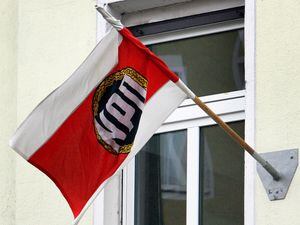German court rules far-right party ineligible for funding because of ideology
The Federal Constitutional Court said Die Heimat ‘continues to disregard the free democratic basic order’.

Germany’s highest court has ruled that a small far-right party will not get any state funding for the next six years because its values and goals are unconstitutional and aimed at destroying the country’s democracy.
The Federal Constitutional Court said the Die Heimat party, which used to be known as the National Democratic Party of Germany, or NPD, “continues to disregard the free democratic basic order and, according to its goals and the behaviour of its members and supporters, is geared towards its elimination”.
Presiding judge Doris Koenig, the court’s vice president, explained the unanimous decision by saying the party’s political concept was incompatible with the guarantee of human dignity as defined by Germany’s constitution, the Basic Law.
Die Heimat adheres to an ethnic concept of German identity and the idea that the country’s “national community” is based on descent, the judge said.
“The propagation of the ethnically defined community results in a disregard for foreigners, migrants and minorities that violates human dignity and the principle of elementary legal equality,” Ms Koenig said.
The German government, as well as the lower and upper houses of parliament, took the party to court. They presented evidence that they said proved Die Heimat was a racist organisation, including its anti-Muslim and antisemitic ideology and its rejection of transgender people.
The government created the possibility of denying a political party state funding after two attempts to ban Die Heimat failed, German news agency dpa reported.
Party leader Frank Franz downplayed the significance of Tuesday’s ruling.
“Yes, it’s not nice for us,” Mr Franz said, according to dpa.
“But anyone who thinks this will throw us out of the game and stop us is very much mistaken.”
Political parties in Germany receive financial support mostly based on their representation in state, national and European parliaments.
Die Heimat has not received any state support since 2021. It received around 370,600 euros (£317,000) in 2016, when it received 3.02% of the vote in a state election in the eastern state of Mecklenburg-Western Pomerania, according to dpa.
Another far-right party, the Alternative for Germany, or AfD, has been riding high in recent opinion polls. Recent surveys put AfD in second place nationally with support of around 23%, far above the 10.3% it won during Germany’s last federal election, in 2021.
In its eastern German strongholds of Brandenburg, Saxony and Thuringia states, polls show AfD is the most popular party ahead of elections this autumn.
Leading German politicians have discussed the possibility of trying to ban AfD or excluding it from financial aid, but no-one has made a serious attempt to do so yet.
German interior minister Nancy Faeser welcomed the constitutional court’s ruling, saying it “sends out a clear signal: Our democratic state does not fund enemies of the constitution”.
“The forces that want to corrode and destroy our democracy must not receive a single cent of state funding for this,” Ms Faeser said.
“Even if the constitutional hurdles for future proceedings remain high, we now have another instrument to protect our democracy.”





